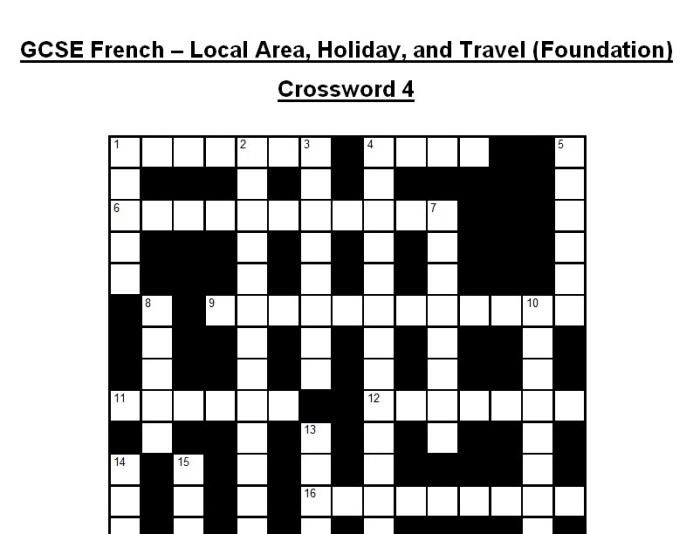The king in france crossword – Embark on an enthralling crossword puzzle adventure with “The King in France,” where history, culture, and wordplay intertwine to create a captivating narrative.
From the grandeur of French monarchs to their enduring legacy in art and literature, this crossword puzzle exploration unveils the rich tapestry of French history and its profound impact on society.
Historical Context

The monarchy played a pivotal role in French history, shaping its political landscape, social structure, and cultural identity. For centuries, the king was the central figure in French society, wielding immense power and authority.
The origins of the French monarchy can be traced back to the 5th century, with the establishment of the Frankish kingdom under Clovis I. Over the following centuries, the monarchy evolved through various dynasties, including the Carolingians, Capetians, and Bourbons.
Timeline of French Kings
The following is a brief timeline of some notable French kings and their reigns:
- Clovis I(481-511): Founded the Frankish kingdom and converted to Christianity.
- Charlemagne(768-814): Crowned Holy Roman Emperor and expanded the Frankish Empire.
- Hugh Capet(987-996): Founded the Capetian dynasty, which ruled France for over 300 years.
- Louis XIV(1643-1715): Known as the “Sun King,” he established absolute monarchy in France.
- Napoleon Bonaparte(1804-1814): Crowned himself Emperor of France and conquered much of Europe.
Role of the King
The French king held a dual role as both the political and spiritual leader of the nation. As the head of state, he possessed absolute power and controlled the government, army, and judiciary.
If you’re puzzling over “the king in france crossword,” consider taking a break with our handy algebra 1 unit 4 answer key . It’ll refresh your mind, and you’ll return to the crossword with a renewed perspective, ready to conquer that elusive monarch.
In addition to his political authority, the king also held religious significance as the “Most Christian King.” He was responsible for protecting the Catholic Church in France and played a central role in religious ceremonies and rituals.
Crossword Puzzle Clues: The King In France Crossword
Crossword puzzles often feature clues related to the “King in France.” These clues can be phrased in a variety of ways, including:
- By name:“French king known as the ‘Sun King'” (LOUIS XIV)
- By title:“King of France who led the Crusades” (LOUIS IX)
- By reign:“French king who reigned from 1643 to 1715” (LOUIS XIV)
- By dynasty:“First king of the Bourbon dynasty” (HENRY IV)
- By nickname:“The Mad King” (CHARLES VI)
Crossword puzzles that have featured clues about French kings include:
- The New York Timescrossword puzzle (April 15, 2023): “French king who built the Palace of Versailles” (LOUIS XIV)
- The Washington Postcrossword puzzle (June 10, 2022): “King of France who was executed during the French Revolution” (LOUIS XVI)
- The Los Angeles Timescrossword puzzle (January 1, 2021): “French king known as the ‘Father of His Country'” (HENRY IV)
Cultural Impact
French kings have had a profound impact on French society, shaping its culture, politics, and identity. They have been depicted in art, literature, and film as symbols of power, wealth, and authority.
In art, French kings have been portrayed in grand portraits, sculptures, and tapestries. These works often depict the king in regal attire, surrounded by symbols of his power and authority. For example, the famous portrait of Louis XIV by Hyacinthe Rigaud shows the king in full regalia, with a scepter in his hand and a crown on his head.
Literature
In literature, French kings have been the subjects of countless novels, plays, and poems. These works often explore the complex relationships between the king and his subjects, as well as the challenges and responsibilities of ruling a kingdom. For example, the play “King Lear” by William Shakespeare tells the story of a king who divides his kingdom among his three daughters, only to see his kingdom torn apart by war and treachery.
Film
In film, French kings have been portrayed in a variety of ways, from historical dramas to comedies. These films often explore the lives and reigns of famous French kings, such as Louis XIV, Napoleon Bonaparte, and Marie Antoinette. For example, the film “The Sun King” (2000) tells the story of Louis XIV’s rise to power and his reign as the Sun King of France.
Modern Relevance
The concept of the “King in France” remains relevant in modern times, particularly in popular culture. French kings and the monarchy continue to serve as sources of inspiration for contemporary works, reflecting the enduring fascination with the grandeur and intrigue of French history.
Popular Culture, The king in france crossword
In literature, film, and television, French kings and the monarchy often feature prominently as symbols of power, authority, and tradition. For example, the popular Netflix series “The Crown” includes several episodes that focus on the reign of King Louis XIV of France.
These depictions provide a glimpse into the opulent lifestyle and political machinations of the French court, showcasing the enduring appeal of royal history.
FAQ Summary
What is the significance of the monarchy in French history?
The monarchy played a central role in shaping French history, providing stability, leadership, and a sense of national identity for centuries.
How have French kings been depicted in art, literature, and film?
French kings have been portrayed in countless works of art, literature, and film, ranging from historical accounts to fictionalized stories. They have served as both symbols of power and inspiration for artists and writers.
In what ways are French kings and the monarchy still referenced in popular culture?
References to French kings and the monarchy can be found in contemporary works such as books, movies, and television shows. They continue to captivate audiences with their stories of intrigue, power, and the enduring human condition.